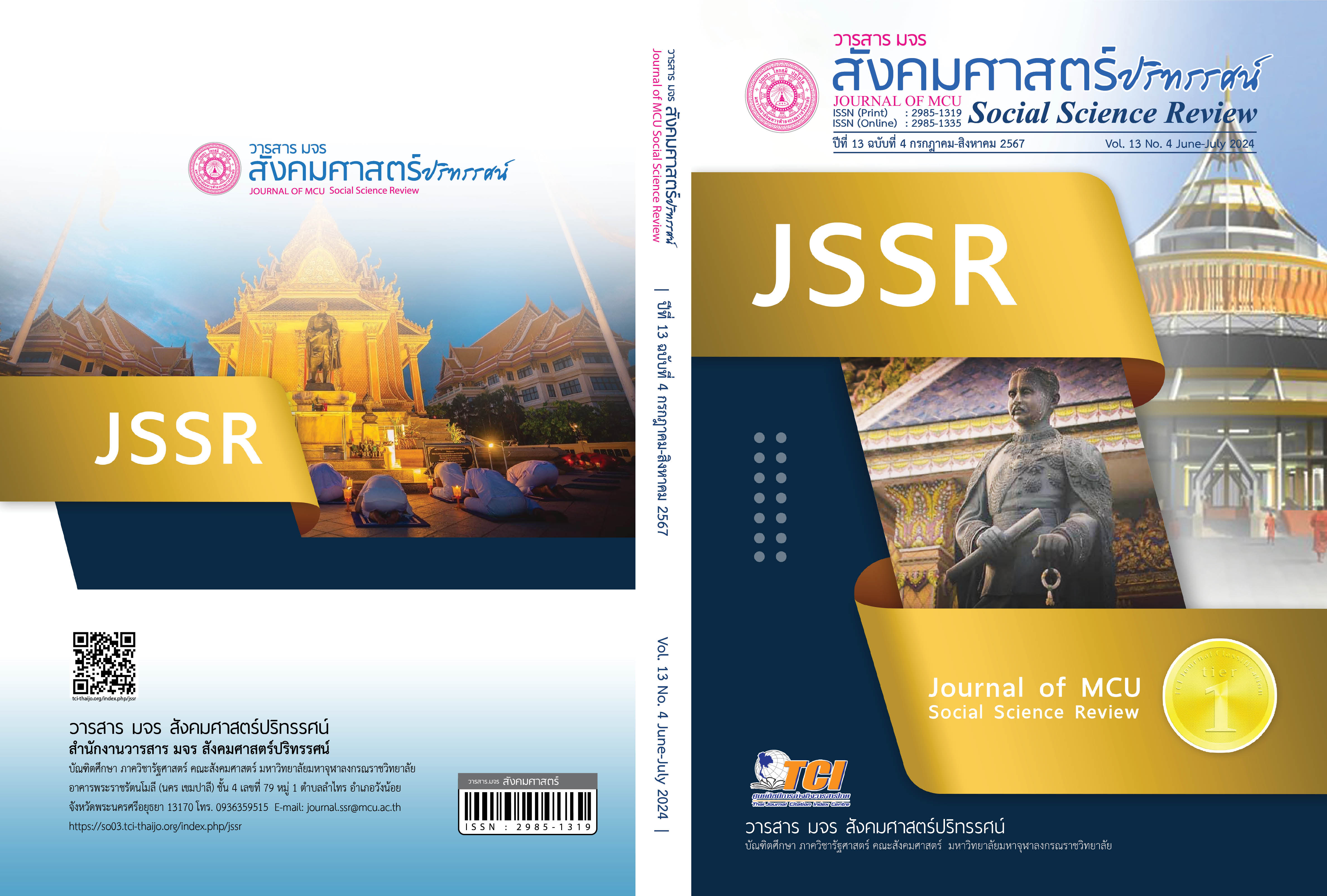การพัฒนาสมรรถนะในการปฏิบัติงานของบุคลากร สำนักงานพระพุทธศาสนาแห่งชาติ
คำสำคัญ:
การพัฒนาสมรรถนะ, การปฏิบัติงาน, สำนักงานพระพุทธศาสนาแห่งชาติบทคัดย่อ
บทความวิจัยนี้มีวัตถุประสงค์ 1. วิเคราะห์สมรรถนะ 2. ประเมินสมรรถนะ 3. สร้างรูปแบบการพัฒนาสมรรถนะในการปฏิบัติงานของบุคลากรสำนักงานพระพุทธศาสนาแห่งชาติ เป็นการวิจัยแบบผสมผสานในการวิจัยเชิงคุณภาพ สัมภาษณ์ผู้ให้ข้อมูลสำคัญ จำนวน 17 รูปหรือคนและในการวิจัยเชิงปริมาณแจกแบบสอบถาม 207 ชุด วิเคราะห์ข้อมูล โดยใช้ค่าร้อยละ คะแนนเฉลี่ย ค่าความเบี่ยงเบนมาตรฐาน และนำเสนอองค์ความรู้เป็นรูปแบบในลักษณะการเสนอและพรรณนาความ (Descriptive Presentation)
ผลการวิจัยพบว่า 1. ด้านบุคลิกภาพ จุดแข็ง มีการสร้างอัตตลักษณ์ จุดอ่อน บุคลากรขาดการฝึกอบรม โอกาส มีบุคลากรที่มาจากหลากหลายสาขาวิชา อุปสรรค มีโรคระบาดไวรัสโคโรนา-2019 ด้านความรู้ทางวิชาการ จุดแข็ง บุคลากรมีความรู้ตามที่ระบุ จุดอ่อน บุคลากรมีความรู้หลากหลาย โอกาส บุคลากรมีโอกาสพัฒนาองค์ความรู้ตลอดเวลา อุปสรรคการปฏิบัติงานมักเป็นเรื่องเดิม ด้านทักษะ จุดแข็ง บุคลากรที่มีทักษะหลากหลายสาขาวิชา จุดอ่อน มีบุคลากรที่เข้ามาบรรจุใหม่ โอกาส มีระบบ IT (ไอที) อุปสรรค การโยกย้ายงานบ่อยครั้ง ด้านเจตคติ จุดแข็ง บุคลากรมีเจตคติที่ดีในการปฏิบัติงาน โอกาส บุคลากรได้สร้างเครือข่ายการทำงาน อุปสรรค บุคลากรปรับเจตคติในการทำงานไม่ได้ ด้านความคิดสร้างสรรค์ จุดแข็ง บุคลากรสามารถสนองงานคณะสงฆ์ได้ จุดอ่อน ความคิดสร้างสรรค์ในการปฏิบัติงานของบุคลากรมีจำกัด โอกาส บุคลากรได้มีโอกาสพัฒนาความคิด อุปสรรค ได้แก่ ยังขาดเรื่องงบประมาณ 2. การประเมินการพัฒนาสมรรถนะในการปฏิบัติงานของบุคลากรสำนักงานพระพุทธศาสนาแห่งชาติพบว่า โดยภาพรวมอยู่ในระดับการปฏิบัติการมาก 3. รูปแบบการพัฒนาสมรรถนะในการปฏิบัติงาน ประกอบด้วย 1. ด้านส่งเสริมพุทธรรมนำชีวิต ปลูกฝังให้บุคลากรมีคุณธรรมจริยธรรม 2. ด้านมุ่งผลสัมฤทธิ์ของงาน เน้นให้สร้างคน สร้างงาน ไม่ยึดติดแนวคิดเดิม 3. ด้านมีจิตอาสา เป็นต้นแบบในการนับถือพระพุทธศาสนา 4. ด้านประสานสามัคคี บุคลากรไม่มีอคติในการทำงานและมีกิจกรรมที่ทำร่วมกันอยู่เสมอ
เอกสารอ้างอิง
ธีระพล เจริญสุข. (2564). การพัฒนาสมรรถนะของบุคลากรกรมสรรพสามิตในเขตกรุงเทพมหานคร (การค้นคว้าอิสระบริหารธุรกิจมหาบัณฑิต สาขาวิชาบริหารธุรกิจ). พระนครศรีอยุธยา: มหาวิทยาลัยราชภัฏพระนครศรีอยุธยา.
พระครูปลัดมหาเถรานุวัตร (ศรัณภิรมย์ กิตฺติธโร). (2562). รูปแบบการพัฒนาการบริหารจัดการสภาพระนักเผยแผ่จังหวัดเพชรบุรี (ดุษฎีนิพนธ์พุทธศาสตรดุษฎีบัณฑิต สาขาวิชาการจัดการเชิงพุทธ). พระนครศรีอยุธยา: มหาวิทยาลัยมหาจุฬาลงกรณราชวิทยาลัย.
พระราชวัลภาจารย์ (ดาวเรือง อาจารคุโณ). (2564). รูปแบบการสงเคราะห์ประชาชนตามโครงการหมู่บ้านรักษาศีล 5 ของคณะสงฆ์จังหวัดราชบุรี (ดุษฎีนิพนธ์พุทธศาสตรดุษฎีบัณฑิต สาขาวิชาการจัดการเชิงพุทธ). พระนครศรีอยุธยา: มหาวิทยาลัยมหาจุฬาลงกรณราชวิทยาลัย.
ภณิดา ชูช่วยสุวรรณ และคณะ. (2562). แนวทางการพัฒนาสมรรถนะการทำวิจัยในชั้นเรียนของครูผู้สอนระดับประถมศึกษา : การประเมินความต้องการจำเป็นสมบูรณ์ (วิทยานิพนธ์ศึกษาศาสตรมหาบัณฑิต สาขาวิชาวิธีวิทยาการวิจัย). กรุงเทพฯ: มหาวิทยาลัยศิลปากร.
สกุล กิตติพีรชล. (2560). ปัจจัยเชิงสาเหตุที่มีอิทธิพลต่อความสามารถในการปรับตัวของบุคลากรกลุ่ม อุตสาหกรรมยานยนต์และชิ้นส่วน (ดุษฎีนิพนธ์ปรัชญาดุษฎีบัณฑิต สาขาวิชาการพัฒนาองค์การและการจัดการสมรรถนะของมนุษย์). ชลบุรี: มหาวิทยาลัยบูรพา.
สำนักงานพระพุทธศาสนาแห่งชาติ. (2560). รายงานประจำปี 2559. กรุงเทพฯ: โรงพิมพ์สำนักงานพระพุทธศาสนาแห่งชาติ.
_____. (2566). บุคลากรสำนักงานพระพุทธศาสนาแห่งชาติ. สืบค้น 7 พฤศจิกายน 2566, จาก https://www.onab.go.th/th/content/page/index/id/276
ดาวน์โหลด
เผยแพร่แล้ว
รูปแบบการอ้างอิง
ฉบับ
ประเภทบทความ
สัญญาอนุญาต
ลิขสิทธิ์ (c) 2024 วารสาร มจร สังคมศาสตร์ปริทรรศน์

อนุญาตภายใต้เงื่อนไข Creative Commons Attribution-NonCommercial-NoDerivatives 4.0 International License.
เพื่อให้เป็นไปตามกฎหมายลิขสิทธิ์ ผู้นิพนธ์ทุกท่านต้องลงลายมือชื่อในแบบฟอร์มใบมอบลิขสิทธิ์บทความให้แก่วารสารฯ พร้อมกับบทความต้นฉบับที่ได้แก้ไขครั้งสุดท้าย นอกจากนี้ ผู้นิพนธ์ทุกท่านต้องยืนยันว่าบทความต้นฉบับที่ส่งมาตีพิมพ์นั้น ได้ส่งมาตีพิมพ์เฉพาะในวารสาร มจร สังคมศาสตร์ปริทรรศน์ เพียงแห่งเดียวเท่านั้น หากมีการใช้ภาพหรือตารางหรือเนื้อหาอื่นๆ ของผู้นิพนธ์อื่นที่ปรากฏในสิ่งตีพิมพ์อื่นมาแล้ว ผู้นิพนธ์ต้องขออนุญาตเจ้าของลิขสิทธิ์ก่อน พร้อมทั้งแสดงหนังสือที่ได้รับการยินยอมต่อบรรณาธิการ ก่อนที่บทความจะได้รับการตีพิมพ์ หากไม่เป็นไปตามข้อกำหนดเบื้องต้น ทางวารสารจะถอดบทความของท่านออกโดยไม่มีข้อยกเว้นใดๆ ทั้งสิ้น





